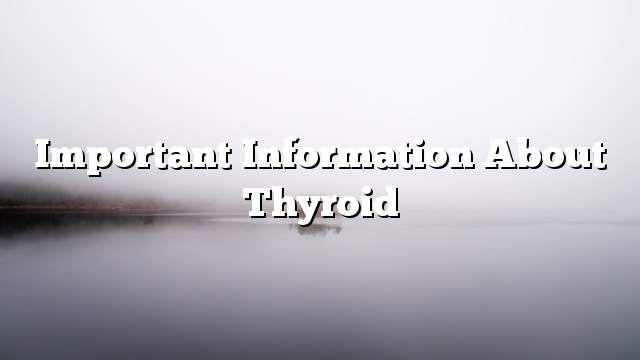Many people suffer from dysfunction in the thyroid gland. Neglecting treatment can have serious consequences for the health of the individual. The symptoms start slightly and worsen over time. Fortunately, when diagnosed, most thyroid problems can be effectively treated, with periodic medical follow-up.
Thyroid problems are divided into two main parts: hypothyroidism and hyperthyroidism, and the diseases that cause each section differ.
1- Thyroid hormone deficiency
Thyroid hormone regulates many vital processes in the human body, and as a result, the lack of this hormone leads to the emergence of a wide spectrum of symptoms of the body, and vary severity of these symptoms vary the severity of the lack of hormone in addition to the length of time that the body is exposed to this deficiency.
Some of the most common symptoms associated with hypothyroidism are: constipation, increased cold sensation, dry skin, muscle pain, dryness and hair loss.
And other symptoms; increased weight, fatigue and fatigue, poor concentration and memory, feeling depressed, general pain in the muscles and joints in addition to menstrual disorder in females, it is worth mentioning that these symptoms may occur as a result of a number of diseases in addition to Hypothyroidism.
Symptoms vary depending on the age and gender of the patient. In infants and children, there is a lack of growth in addition to inactivity.
The elderly may notice a slowdown in the level of mental and cognitive activity without the appearance of other symptoms, and in the robes may show hypothyroidism in an irregular or dense cycle or difficulty in pregnancy.
The patient is advised to consult with the doctor if any of the previous symptoms in order to assess the need for a laboratory examination of the level of thyroid hormone.
Hyperthyroidism
Hyperthyroidism also causes a wide range of symptoms, which vary depending on the age of the patient, duration and severity of the disease, type of disease leading to thyroid disease, in addition to the presence of other diseases contribute to the picture pathological.
The most common symptoms of patients under the age of fifty years: accelerated heartbeat, increased sweating, constant feeling of heat, hyperthyroidism, nervousness, agitation, tremor, weight loss despite the increased appetite for food and water, and Rare cases may affect the patient tremor of the atrial heart or lack of appetite, it should be noted that these symptoms are arranged in descending order of incidence in patients.
The symptoms that affect the elderly (descending order by incidence): accelerated heartbeat, general fatigue, weight loss, hyperthyroidism, tremor or tremor, heart ache tremor, lack of appetite for food, nervousness and agitation, depression, increased sweating and The impossibility of free.
Other manifestations of hyperthyroidism include diarrhea, menstrual cycle disorders, difficulty in pregnancy, insomnia, high blood pressure and sometimes psychosis.
In addition to the symptoms of the disease that causes hyperthyroidism, the most common disease Graves; (in addition to the previous symptoms) lead to the presence of manifestations of the eye such as the eyes, and increase the secretion of tears and congestion of conjunctivitis. In the case of thyroiditis, the patient suffers from neck pain and enlarged gland.
Treatment varies with different disease, but the first step is to diagnose the disease from the symptoms of the body.
